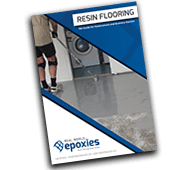Home › Advice › Know How › Knowhow
Water-borne vs Solvent-borne vs Solventless Epoxies
I’ve been asked countless times to explain the differences among water-borne, solvent-borne and solventless epoxies and what it all means as far as their suitability for certain flooring applications.
They’re all epoxies of course, what does change is the “delivery” of the resin. For some quick definitions:
- Water-borne epoxies are epoxies dispersed in water, which evaporates from the film after application.
- Solvent-borne epoxies are epoxies dispersed in organic solvent, which evaporates from the film after application.
- Solventless epoxies are epoxies that have nothing evaporating from the film after application.
The key question is how do those basic differences impact on which one I choose?
There are all sorts of reasons why an epoxy user might choose one over the other; each type has advantages and there’s not one product for all applications. However, for concrete flooring applications this is the way I see it.
Solvent-borne epoxies
Solvent-borne epoxies are the traditional epoxy. The solvents allow the coating to apply easily in thin films and deal with any formulating
problems like surface tension. Originally designed to protect steel, it was later used for concrete structures and has been adapted for
flooring.
Its viscosity and relative ease of use (including long pot life) make it an adaptable type of coating where thin films are required, however the product can have some nasty aspects, e.g. solvents and solvent entrapment. Also, I don't believe 150 microns/6 mils total dry film thickness provides a long term flooring solution when the profile of concrete itself can vary just as much.
Water-borne epoxies
Water-borne epoxies were first used as moisture barriers to deal with hydrostatic pressure in concrete slabs. They’re characterised by a
smooth, creamy texture and are effortless to roll out. Being water-soluble, they can easily penetrate into the slab pores and harden,
blocking off the pores moisture travels through.
As water-borne epoxies are so nice to apply there’s a natural temptation to use them as floor coatings, but there are some inherent problems
when doing so. The most pressing is the inferior film strength when compared to the other two epoxy types. Also, because water is slower to
evaporate than organic solvents there’s a greater risk of solvent entrapment issues. A classic example being the thicker regions of a film
created when over-coating divots; the epoxy starts to crosslink before the water can escape and leads to softer, weaker spots.
Water-borne epoxies are also considered by many as a better environmental alternative, but being water based does not necessarily mean it
has less impact on the environment. That is a whole new topic that I might need to cover later!

Solventless epoxies
Solventless epoxies - also called solvent-free epoxies or 100% solids epoxies - have the performance of solvent-borne epoxies in many ways,
but do not contain evaporative solvent. Without the solvent, the viscosity is quite different, and it applies quite differently. If you are
used to either solvent-borne epoxies or water-borne epoxies, and you wanted to change to solventless, I would spend some time talking to the
manufacturer and playing with some samples. The capabilities of solventless epoxies are tremendous, and they’re very versatile, but don’t
think they can do the job of a water-borne epoxy for hydrostatic pressure or go down at less than 100 microns like a solvent-borne epoxy.
As I said before, each technology has its own advantages. For concrete flooring, I will generally only talk about two-pack solventless epoxy
technology as it is the most versatile across a range of epoxy applications such as residential
flooring,
retail flooring, commercial flooring and industrial
flooring.
-
Learning - Learn more about solventless, two-pack epoxies and how they compare to solvent-borne and water-borne
products with our online courses:
- Epoxy Flooring Short Courses
- Bronze Card Course
- Silver Card Course
-
Ask a question - If you have any questions you'd like to ask us about this topic, hit the support button below:
_800x271a.png)
